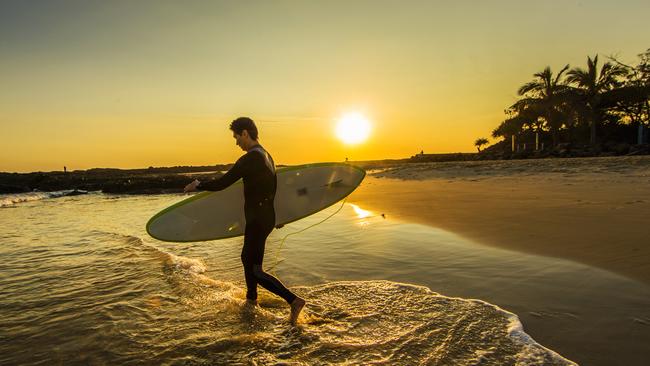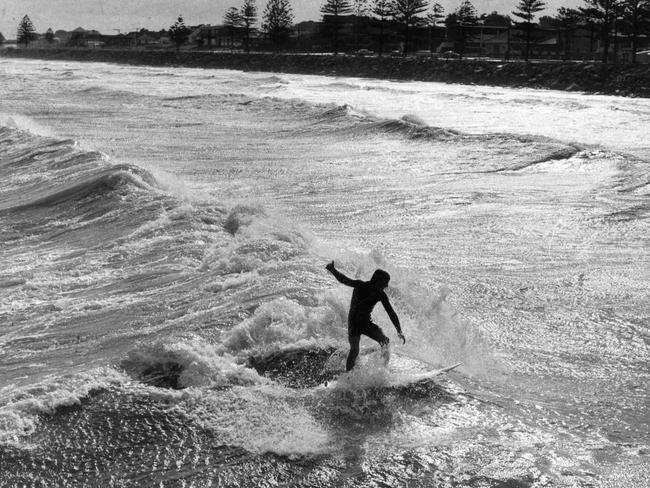Humans must keep learning, or stagnate
A SINGLE surfing lesson changed my life. I may never be great, but it’s nonsense to think you’re ever too old for learning something new, writes Janes Fynes-Clinton.
Rendezview
Don't miss out on the headlines from Rendezview. Followed categories will be added to My News.
FIVE years ago this week, I had a single surfing lesson — it was the first of my life and I loved it immediately.
I felt the intoxicating surge of pleasure that comes with standing on a moving object and feeling the hand of the sea pushing from behind, but it was a false start.
I set surfing aside and vowed to take more lessons once I was not juggling both full-time study and full-time work.
Then, two years later, when my PhD was close to being complete, I began to claim my reward one lesson at a time.
While it cost me time, patience, effort and money, I quickly found it made me richer.
I was already older than 40 when I learnt to surf and Tyler Wright and Steph Gilmore were never going to be in any danger.
It was the first pursuit I had undertaken in a very long time that did not have a defined outcome such as an event, a flight, a degree, a material thing.

I also found it was not very easy, but then anything worth having rarely is.
The need to keep learning new things is core business for humans and learning, ideally, should be lifelong.
It should not be considered odd to start something new in older years.
Studies show our brains need stimulation. We instinctively seek to live until the day we die, not simply to survive.
And we must move deliberately in the sedentary, digital age, for a healthy body and mind.
I have always been sporty in and out of the water, but while I have always felt connected to the sea, surfing has brought that affinity to another level.
The bond to the ocean feels innate; it is calming, powerful, spiritual and respectful.
Surfing has taught me the impact and consequences of split-second decisions: to choose to ignore the alarm or bounce out in the pre-dawn dark; to paddle hard or to let that one go.
Once, I had the nickname Taz — the Loony Tunes Tasmanian devil. I tend to tackle tasks like a whirling dervish and live like I will die tomorrow.
But the ocean has taught me to slow down.
A surf coach once told me I needed a “little less fire and a little more aim”.
Another espoused that honouring the subtle power of “rhythm, feel, flow” about would help me.
I took both on board and now, finally, I get it.
After learning the mechanics, surfing is something you feel. And you need to empty yourself out there.
I am sometimes an overthinker, so it took ages to deeply understand that.
When I forget to just go with it, the ocean gives me a reminder that can be as subtle as a brick in the face.
It has dumped me violently and held me down on the sea floor until I have felt my lungs lie flat and my chest scream.
I have even been “tombstoned” — pushed so deep under the surface that the leg rope is outstretched and the board is half submerged — which is not an experience I am in a hurry to repeat.

I have learnt to paddle out and pause after catching a wave instead of always maniacally turning for the next possible ride, scared it might be the wave of the day and I will miss it.
There will always be another wave.
Reconnecting with the ocean after a wave is as important as the wave itself, I have learnt.
A turtle popping up and eyeballing me as I rested out the back this week affirmed that.
Surfing also fosters communities.
In my own coastal neighbourhood, an eclectic group has organically grown, linked on shore by coffee, and on the sea by a love for the stoke — the feeling that comes from catching a wave.
We are all ages, stages in life, abilities and professions and it has become a support system like I have rarely known.
We have kept showing up, working around families, jobs, holidays, injury and illness.
We speak a lot or little, with riding waves acting as punctuation marks.
My friends have helped contextualise the learning experiences such as the scolding that can come after dropping in on someone cranky and more experienced.
Together, we have learnt about board control, etiquette and the dreadful frustration of another surfer snaking a wave because we are newish.
But most of all, each time I see the rising sun from my board, afloat on the ocean, I know that I have found my soul food.
Happy New Year.
Dr Jane Fynes-Clinton is the journalism program co-ordinator at the University of the Sunshine Coast.


